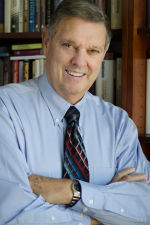In Memory Of…Keith Rayner
Honoring scientists who have made important and lasting contributions to the sciences of mind, brain, and behavior.
Keith Rayner, PhD (1943-2015)
Atkinson Family Distinguished Professor
University of California, San Diego
Keith Rayner was, more than any other person, responsible for how eyetracking methodology rejuvenated research in reading. His methodological and theoretical innovations sparked the experimental work on sentence processing that dominated the field of experimental psycholinguistics for decades. His contributions to the experimental study of reading have had a major impact on practice by professional reading educators and clinicians interested in reading disorders. His reviews of the field (Psychological Bulletin, 1978 and 1998) are the standard references on the eye movements and higher cognitive processes. He is on the list of “most frequently cited psychologists” prepared by the Web of Science. His own research has established some empirical phenomena that will endure long after today’s theories have become yesterday’s. And his work as mentor of graduate students and postdoctoral fellows and trainees, as well as his editorial work and other contributions to the profession of psychology, have helped ensure that the study of cognition will continue to be both scientifically sound and intellectually exciting.
In his early research, Rayner developed techniques for measuring eye movements during normal reading and used them to measure the perceptual span in reading. In a long and productive line of research designed to answer such questions, Rayner and his colleagues discovered that the span is determined by attentional factors, and that it is asymmetric, skewed in the direction toward which attention is shifting. Rayner’s research has examined many important questions, including how information is integrated across fixations in reading, how phonology is involved in silent reading, and how linguistic knowledge is brought to bear in the process of comprehending what one is reading. In recent years, Rayner and his colleagues have developed an explicit, implemented model of reading (the “E-Z Reader Model”), which has inspired the development of several related and competing models of eye movement control in reading. This explicit modeling work has introduced a new level of precision into the study of the process of recognizing words during reading and how this process controls eye movements.
Rayner’s recent work focused on the fundamental processes of how we recognize words and how word recognition controls eye movements. He explored these topics in readers of Chinese, in deaf individuals, and in older readers, among other populations, always searching for both universals of processing and for differences in how different groups read. Rayner’s research has had a major impact on applied approaches to the study of reading. By making the process of reading less mysterious, more open to experimental study, it has permitted educators and clinicians to think straightforwardly about what processes may be disrupted in cases of dyslexia, delayed reading and reading impairment.
Many academic honors have come Rayner’s way, including membership in the Society of Experimental Psychology, election to the Bartlett Lectureship of the Experimental Psychology Society, and receipt of the first Outstanding Scientist Award from the Society for the Scientific Study of Reading. Much of Rayner’s career was spent at the University of Massachusetts Amherst, where he established the Eyetracking Laboratory, still an active and productive lab. He was most recently Distinguished Professor at University of California San Diego, holder of the Atkinson Chair in Psychology. At both institutions, he mentored over two dozen PhD recipients and at least an equal number of post-doctoral scholars, a great many of whom have gone on to distinguished careers. They all profited from his clear-minded insistence on letting conclusions be guided by data, not by prior theoretical commitments.
Individuals Honoring Keith Rayner:
Jane Ashby, Central Michigan University
David Balota, Washington University in St. Louis
Nathalie Belanger, University of California, San Diego
Derek Besner, University of Waterloo
Katherine S. Binder, Mount Holyoke College
Monica Castelhano, Queen’s University
Kyle Cave, University of Massachusetts, Amherst
Charles Clifton Jr., University of Massachusetts, Amherst
Anne E. Cook, The University of Utah
Rosemary Cowell, University of Massachusetts, Amherst
Michael Dambacher, University of Konstanz
Avital Deutsch, The Hebrew University of Jerusalem
Victor Ferreira, University of California, San Diego
Steven Frisson, University of Birmingham
Peter Gordon, The University of North Carolina at Chapel Hill
Arthur C. Graesser, University of Memphis
Harold Greene, University of Detroit Mercy
Emily Higgins
David Huber, University of Massachusetts, Amherst
Jukka Hyönä, University of Turku
Albrecht Inhoff, Binghamton University
Rebecca Johnson, Skidmore College
Barbara Juhasz, Wesleyan University
Rachel Keen, University of Virginia
Jung-Oh Kim, Seoul National University
Brooke Lea, Macalester College
Hye-Won Lee, EWHA Womans University
Young ai Lee, EWHA Womans University
Xingshan Li, Chinese Academy Sciences
Susan Lima, University of Wisconsin-Milwaukee
Simon Liversedge, The University of Southampton
Robert Lorch, University of Kentucky
Kathleen B. McDermott, Washington University in St. Louis
Jerome Myers, University of Massachusetts, Amherst
Edward O’Brien, University of New Hampshire
Kevin Paterson, University of Leicester
Eyal Reingold, University of Toronto
Henry L. Roediger, III, Washington University in St. Louis
Caren Rotello, University of Massachusetts, Amherst
Lisa Sanders, University of Massachusetts, Amherst
Paula Schwanenflugel, University of Georgia
Andrew Stewart, The University of Manchester
Janice Templeton, Fort Lewis College
Jennifer Wiley, University of Illinois at Chicago
Carrick Williams, Mississippi State University
Meilin Zhan, University of California, San Diego
* The FABBS Foundation would like to thank Drs. Charles Clifton Jr., Arthur C. Graesser, Brooke Lea, and Caren Rotello for nominating Dr. Rayner for this honor and for leading the effort to spread the word about his nomination.
